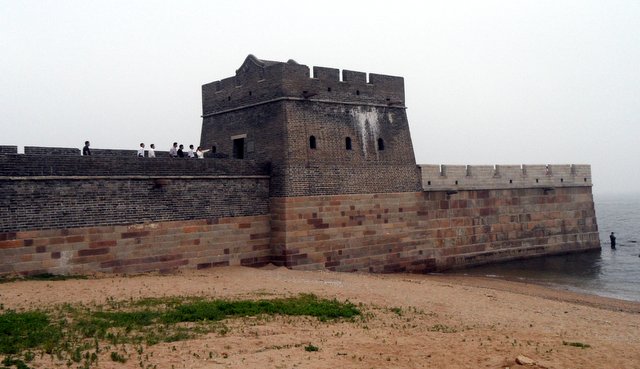
A traditional Chinese saying states that “He who has never been to the Great Wall is not a true man”(1). Having previously seen the western end of the Great Wall of China 6700km away in Jiayuguan, walked along the unrestored section from Jinshanling to Simatai and nearly been decapitated at Mutianyu, it seemed only appropriate to finally see where the wall ends in the east.
Unlike the trip south to Shanghai, Hebei province three hours to the west of modern Beijing is a very different China. The cities are dustier, the cars more beaten up and there’s a distinct lack of police presence enforcing any sort of road rules. Lorries loaded with cages full of dogs swerve along the road, with their cargo barking dejectedly at the sheep and chickens grazing on the verge of the 6-lane expressway.
Arriving at Shanhaiguan we went straight to Laolongtou, or The Old Dragon’s Head, a small fort where the wall meets the Bohai Sea. Originally built by the Ming dynasty between 1368 and 1644 it extends about 20m into the water and looks vaguely like a dragon drinking water.
Climbing onto the Great Wall it’s possible to walk to the very end, where the wall meets the sea. Previously used to keep out the invaders from the north, it’s now a popular fishing spot. Curving away from the wall is a sandy beach which leads round to a temple honouring the sea god, which also extends a considerable distance out over the water.
Supposedly only two hotels in Shanhaiguan are allowed to take foreigners, and neither looked too appealing so we headed to the nearby town of Qinhuangdao and found a decent looking government-run place. What we didn’t realise is this meant they’d be extra thorough with all the paper work so it took 45 minutes at reception to check our visas with the local Public Security Bureau to verify that we were still allowed in the country.
We had dinner at the best reviewed restaurant in town, which was a cavernous place on the seafront, notable for the size of the aquarium in the back which also doubled as the menu. You could point at any type of fish or octopus or slimy thing in a shell and it would rapidly be prepped and cooked by the attendant chefs. Despite my general dislike of seafood everything was delicious and we inevitably ordered far too much, so decided some exercise was in order for the next day.
—
After a government approved hotel breakfast of cold rice and celery we travelled back to Shanhaiguan to visit the main garrison barracks there at ‘Tianxia Diyi Guan’, or ‘First Pass under Heaven’. This passage through the Great Wall now forms the east gate of the city and has been heavily restored in the past twenty years, but our plans of walking to Jiao Shan were scuppered by a large iron door blocking any attempts at hiking more than a few meters from the gift shop.
Instead we drove out to Jiao Shan, which is the first mountain the Great Wall climbs. It plunges down the mountainside to a low point at the Five Buddha Park and we lazily opted to take the cable car up, which turned out to be a rather precarious looking chairlift.
Walking down from the peak may well have been just as hard as walking up. The stones are smooth and slippery, and the steps fall up to half a meter. The wall is up to 10 meters high and 5 meters wide, punctuated by the occasional guard tower. These pose serious problems in passing along the wall as they can only be reached by ladders, so it’s necessary to climb up and down a few meters each time – not great with a backpack, probably worse with a spear and shield. As you get lower the wall becomes wider and smoother, with a serious lean to the left. Being just before the October holidays, when the whole country gets 10 days off, the wall and park were nearly empty so thankfully we could struggle along in peace.
The only person we met on the way down was an old lady selling warm Cokes, who smiled happily when she saw just how much we needed it.
1 I later discovered it’s not literal. In Chinese poetry the Great Wall symbolises overcoming many difficulties and reaching your aim, thus it actually means that ‘He who has not experienced adversity will never be a true man’.
Another Chinese proverb is “A man without money is no man at all” so it’s time to go back to the UK and make some…






Pingback: Mutianyu Great Wall of China Visitor Tips | YNFAH
Pingback: @berkun
Pingback: @deb_lavoy
Pingback: @richard_lord